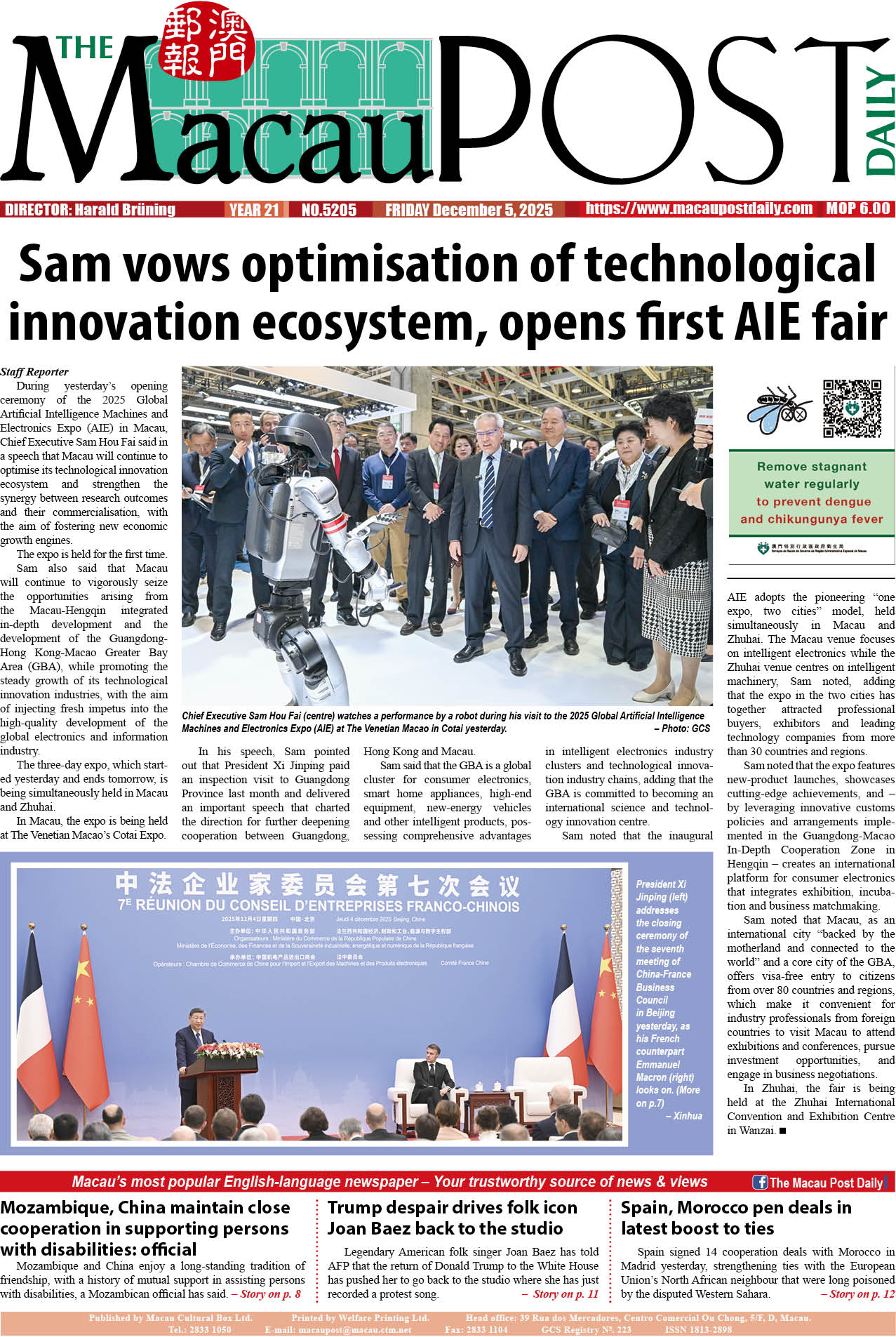Editorial
President Xi Jinping’s Global Security Initiative (GSI) that he proposed in his speech by video link from Beijing at the Boao Forum for Asia Annual Conference 2022 in Hainan on Thursday is a timely move considering the plight our planet is in – the Ukraine crisis being just one of various regional security hotspots, some of which have been festering for decades or years such as the Israel-Palestine conflict and Yemen’s “forgotten war”.
Foreign Ministry spokesman Wang Wenbin has described Xi’s speech – titled “Rising to Challenges and Building a Bright Future through Cooperation” as “yet another global public good offered by China and a vivid illustration of the vision of a community with a shared future for mankind in the security field.”
Owing to both its significance and timeliness, The Macau Post Daily decided to upload the full text of Xi’s speech on our website a few hours after he had delivered it (https://www.macaupostdaily.com/article13994/.html)
In his address, Xi said that “China would like to propose a Global Security Initiative, that is, to stay committed to the vision of common, comprehensive, cooperative and sustainable security, and work together to maintain world peace and security…”.
The president spoke out against the Cold War mentality, unilateralism, block confrontation and, among other issues, “pursuit of one’s own security at the cost of others’ security.”
And he spoke up for “upholding the principle of indivisible security and the building of a balanced, effective and sustainable security architecture.”
4 ‘things we need to do’
I was impressed by Xi’s enumeration of four “things we need to do” to make the world a safer place for all of us: 1) We need to work together to defend people’s lives and health; 2) We need to work together to promote economic recovery; 3) We need to work together to maintain peace and stability in the world; 4) We need to work together to tackle global governance challenges.
Speaking metaphorically, Xi underlined that “countries around the world are like passengers aboard the same ship who share the same destiny. For the ship to navigate the storm and sail towards a bright future, all passengers must pull together. The thought of throwing anyone overboard is simply not acceptable.”
Bene dictum!
In the first part of his speech Xi quoted the ancient Chinese adage that “people must not change their commitment or give up their pursuit even in the face of danger and risk,” before pointing out that “a review of human history teaches us that the more difficult things get, the greater the need grows to stay confident. Problems are not to be afraid of, as it is one problem after another that have driven the progress of human society.”
And he concluded his speech with another old Chinese maxim: “Keep walking and one will not be daunted by a thousand miles; make constant efforts and one will not be intimidated by a thousand tasks.”
The gist of Xi’s speech is a clear rejection of unilateralism and hegemony, as well as an impassioned plea for multilateralism, the building of a community with a shared future for mankind and, last but not least, respect for different countries’ independent choices of their own development paths and social systems.
Xi’s GSI proposal is both significant and timely as it comes at a conjuncture of growing threats to global stability such as the West’s “unprecedented” sanctions against Russia over the latter’s military operation in Ukraine that have turned a regional conflict into a global menace to the livelihoods and food and energy needs of billions of people. I can’t avoid surmising that Western politicians’ ill-conceived sanctions harming not only Russians but also their fellow citizens are a kind of self-flagellation.
The Ukraine conflict, which should and could have been avoided if the principle of indivisible security had been heeded by all those involved, must be urgently tackled through negotiations and mediations. The bloodshed must end. This requires both sides’ willingness to meet each other halfway and also to accept a healthy dose of realism – something that Italian philosopher Niccolò Machiavelli (1469-1527) called ‘verità effetuale della cosa’ (“the actual truth of things”), or the concrete reality of things, i.e., for politics to be useful it must first look at things how they are and not how one would like them to be. In other words, in order to be able to make progress one must first know the concrete reality of the situation. Both Mao Zedong and Deng Xiaoping famously quoted the ancient Chinese idiom of “seeking truth from facts” (实事求是).
The fact is that the current hostilities between Russia and Ukraine have historical reasons that should have been tackled by both sides years ago. History has shown again and again that armed conflict is the direct result of political failure. The Ukraine-Russia clash is just the latest example of this all-too-frequent predicament in international relations.
Anyhow, I hope that UN Secretary General António Guterres will play a more active, perceptive and balanced role in mediating between Moscow and Kyiv. His trip to both capitals could be a step in the right direction. I would assume that he has read Xi’s speech…
– Harald Brüning






